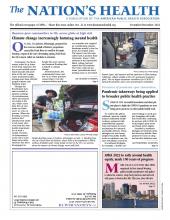
Anyone can be a messenger for climate justice. Youth around the world are calling for action.
Photo by Jacoblund, courtesy iStockphoto
As the Biden administration gets ready to spend billions to combat climate change, now is a critical time to engage policymakers on the importance of climate justice, health advocates say.
In August, President Joe Biden signed legislation hailed by many as the most aggressive U.S. climate investment to date. The law, the Inflation Reduction Act, authorizes $369 billion to promote clean energy and cut carbon emissions. Katherine Catalano, MS, deputy director of APHA’s Center for Climate, Equity and Health, said the new law could be a game-changer, though there are legislative trade-offs that will bolster new fossil fuel infrastructure and put front-line communities at risk.
The goal now is to make sure climate justice is baked into the law’s implementation, Catalano said, from how the new money is distributed to where actual emissions are cut. And it will be crucial to continue pushing for stronger regulations to minimize damage from any new fossil fuel infrastructure.
“The urgency of this moment cannot be overstated,” Catalano told The Nation’s Health. “We need to make sure this money is spent in a way that addresses justice.”
“Climate justice” generally recognizes that groups already at a systemic disadvantage and who contribute least to climate change also bear a disparate burden of harmful climate change effects. Climate justice focuses on solutions directed toward marginalized and overburdened communities.
There are many resources available to help advocates engage policymakers at all levels of government on the issue. One tool is storytelling, which helps people draw on their personal climate change experiences to create engaging stories. Bineshi Albert, co-executive director of the Climate Justice Alliance, said storytelling that focuses on “communities and everyday people” often resonates best.
“We’ve known the data for decades, but the human impact is typically what moves people,” she told The Nation’s Health. “This is especially true when it comes to the climate crisis, as science is up against a powerful fossil fuel lobbying effort to discredit it every day.”
Albert said policymakers may be unaware of the many community-driven climate solutions already unfolding on the ground.
“Without climate and environmental justice and the inclusion of the communities who brought those movements to life, the climate crisis cannot adequately be addressed,” Albert said.
To advance climate justice, policymakers must hear directly from those most harmed, both their stories and their solutions, said Osprey Orielle Lake, founder and executive director of Women’s Earth and Climate Action Network. The network hosts a storytelling database, “Women Speak,” that features thousands of stories by and about women fighting for climate justice.
“Personal stories are vital to humanizing the climate crisis,” she told The Nation’s Health. “At the same time, it’s also important to have the data and research to show that a different world is possible.”
Anyone can be a messenger for climate justice, Lake urged.
“As we find a way forward, we must make sure there are no more sacrificed people or lands or disposable communities,” she said.
For more, visit www.apha.org/climate.
- Copyright The Nation’s Health, American Public Health Association









